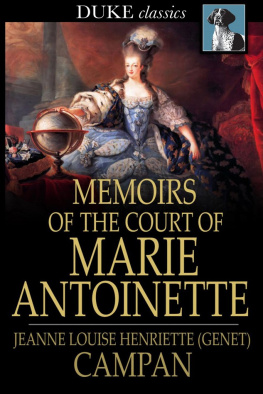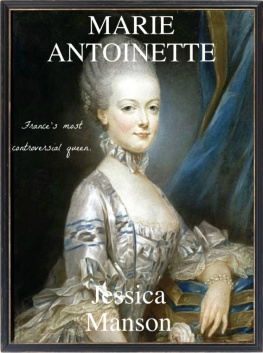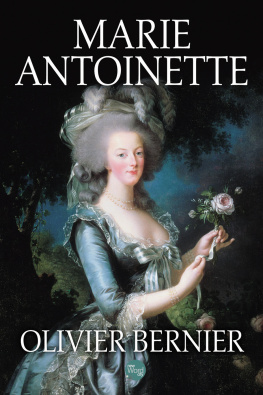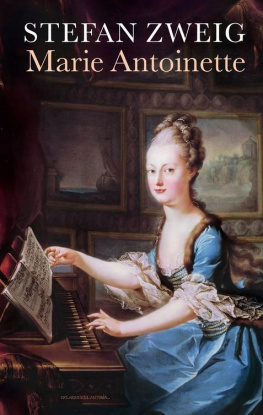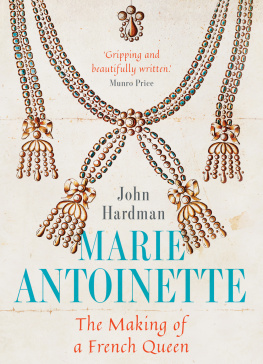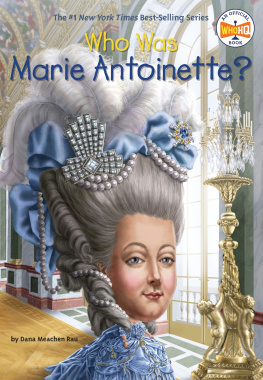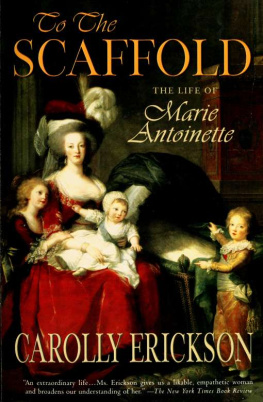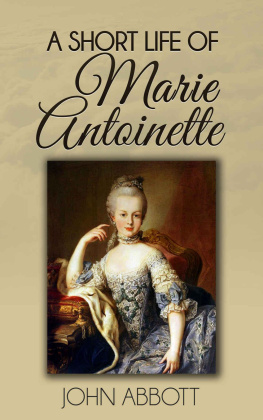MEMOIRS OF THE COURT OF MARIE ANTOINETTE
QUEEN OF FRANCE
* * *
JEANNE LOUISE HENRIETTE CAMPAN
*
Memoirs of the Court of Marie Antoinette
Queen of France
From an 1818 edition
ISBN 978-1-62011-726-2
Duke Classics
2012 Duke Classics and its licensors. All rights reserved.
While every effort has been used to ensure the accuracy and reliability of the information contained in this edition, Duke Classics does not assume liability or responsibility for any errors or omissions in this book. Duke Classics does not accept responsibility for loss suffered as a result of reliance upon the accuracy or currency of information contained in this book.
Contents
*
*
MEMOIRS OF THE COURT OF
MARIE ANTOINETTE,
QUEEN OF FRANCE
Being the Historic Memoirs of Madam Campan,First Lady in Waiting to the Queen
Preface by the Author
*
Louis XVI. possessed an immense crowd of confidants, advisers, and guides;he selected them even from among the factions which attacked him. Never,perhaps, did he make a full disclosure to any one of them, and certainlyhe spoke with sincerity, to but very few. He invariably kept the reins ofall secret intrigues in his own hand; and thence, doubtless, arose thewant of cooperation and the weakness which were so conspicuous in hismeasures. From these causes considerable chasms will be found in thedetailed history of the Revolution.
In order to become thoroughly acquainted with the latter years of thereign of Louis XV., memoirs written by the Duc de Choiseul, the Ducd'Aiguillon, the Marechal de Richelieu,and the Duc de La Vauguyon, should be before us. To give us a faithfulportrait of the unfortunate reign of Louis XVI., the Marechal du Muy, M.de Maurepas, M. de Vergennes, M. de Malesherbes, the Duc d'Orleans, M. deLa Fayette, the Abby de Vermond, the Abbe Montesquiou, Mirabeau, theDuchesse de Polignac, and the Duchesse de Luynes should have notedfaithfully in writing all the transactions in which they took decidedparts. The secret political history of a later period has beendisseminated among a much greater number of persons; there are Ministerswho have published memoirs, but only when they had their own measures tojustify, and then they confined themselves to the vindication of their owncharacters, without which powerful motive they probably would have writtennothing. In general, those nearest to the Sovereign, either by birth orby office, have left no memoirs; and in absolute monarchies themainsprings of great events will be found in particulars which the mostexalted persons alone could know. Those who have had but little undertheir charge find no subject in it for a book; and those who have longborne the burden of public business conceive themselves to be forbidden byduty, or by respect for authority, to disclose all they know. Others,again, preserve notes, with the intention of reducing them to order whenthey shall have reached the period of a happy leisure; vain illusion ofthe ambitious, which they cherish, for the most part, but as a veil toconceal from their sight the hateful image of their inevitable downfall!and when it does at length take place, despair or chagrin deprives them offortitude to dwell upon the dazzling period which they never cease toregret.
Louis XVI. meant to write his own memoirs; the manner in which hisprivate papers were arranged indicated this design. The Queen also hadthe same intention; she long preserved a large correspondence, and a greatnumber of minute reports, made in the spirit and upon the event of themoment. But after the 20th of June, 1792, she was obliged to burn thelarger portion of what she had so collected, and the remainder wereconveyed out of France.
Considering the rank and situations of the persons I have named as capableof elucidating by their writings the history of our political storms, itwill not be imagined that I aim at placing myself on a level with them;but I have spent half my life either with the daughters of Louis XV. orwith Marie Antoinette. I knew the characters of those Princesses; Ibecame privy to some extraordinary facts, the publication of which may beinteresting, and the truth of the details will form the merit of my work.
I was very young when I was placed about the Princesses, the daughters ofLouis XV., in the capacity of reader. I was acquainted with the Court ofVersailles before the time of the marriage of Louis XVI. with theArchduchess Marie Antoinette.
MADAME CAMPAN
My father, who was employed in the department of Foreign Affairs, enjoyedthe reputation due to his talents and to his useful labours. He hadtravelled much. Frenchmen, on their return home from foreign countries,bring with them a love for their own, increased in warmth; and no man wasmore penetrated with this feeling, which ought to be the first virtue ofevery placeman, than my father. Men of high title, academicians, andlearned men, both natives and foreigners, sought my father's acquaintance,and were gratified by being admitted into his house.
Twenty years before the Revolution I often heard it remarked that theimposing character of the power of Louis XIV. was no longer to be found inthe Palace of Versailles; that the institutions of the ancient monarchywere rapidly sinking; and that the people, crushed beneath the weight oftaxes, were miserable, though silent; but that they began to give ear tothe bold speeches of the philosophers, who loudly proclaimed theirsufferings and their rights; and, in short, that the age would not passaway without the occurrence of some great outburst, which would unsettleFrance, and change the course of its progress.
Those who thus spoke were almost all partisans of M. Turgot's system ofadministration: they were Mirabeau the father, Doctor Quesnay, AbbeBandeau, and Abbe Nicoli, charge d'affaires to Leopold, Grand Duke ofTuscany, and as enthusiastic an admirer of the maxims of the innovators ashis Sovereign.
My father sincerely respected the purity of intention of thesepoliticians. With them he acknowledged many abuses in the Government; buthe did not give these political sectarians credit for the talent necessaryfor conducting a judicious reform. He told them frankly that in the artof moving the great machine of Government, the wisest of them was inferiorto a good magistrate; and that if ever the helm of affairs should be putinto their hands, they would be speedily checked in the execution of theirschemes by the immeasurable difference existing between the most brillianttheories and the simplest practice of administration.
Destiny having formerly placed me near crowned heads, I now amuse mysolitude when in retirement with collecting a variety of facts which mayprove interesting to my family when I shall be no more. The idea ofcollecting all the interesting materials which my memory affords occurredto me from reading the work entitled "Paris, Versailles, and the Provincesin the Eighteenth Century." That work, composed by a man accustomed tothe best society, is full of piquant anecdotes, nearly all of which havebeen recognised as true by the contemporaries of the author. I have puttogether all that concerned the domestic life of an unfortunate Princess,whose reputation is not yet cleared of the stains it received from theattacks of calumny, and who justly merited a different lot in life, adifferent place in the opinion of mankind after her fall. These memoirs,which were finished ten years ago, have met with the approbation of somepersons; and my son may, perhaps, think proper to print them after mydecease.

